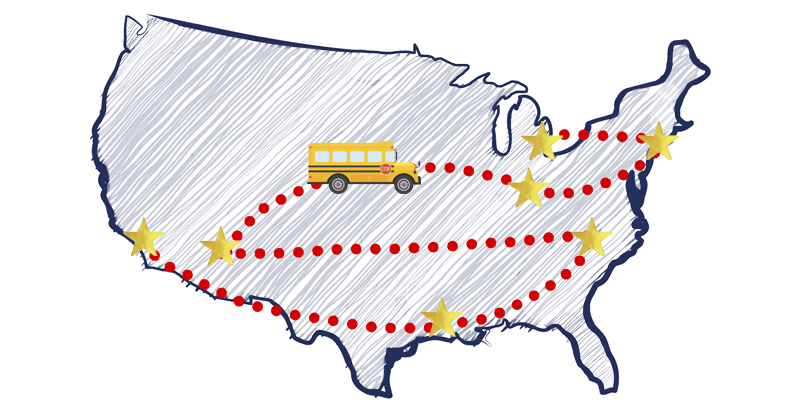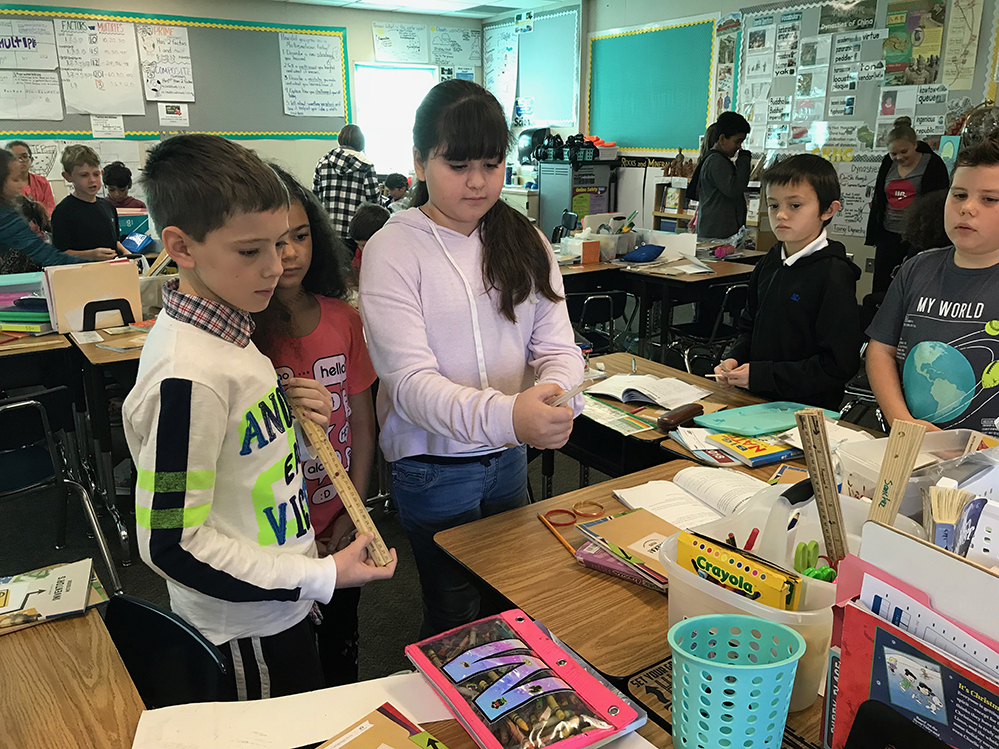Innovation Road Trip: Traveling From Coast to Coast to Explore Knowledge-Rich American Schools

This is the first post in a new travel blog series on The 74, in which the Knowledge Matters Campaign, which is part of StandardsWork, will take us on an adventure through classrooms across the country. Sign up for The 74’s newsletter to learn about new installments.
When was the moment you fell in love with learning? If you ever fell in love with learning?
For most of us, it probably wasn’t when we were conjugating verbs, learning about inferences, or sequencing events. More likely it happened when our papier-mâché volcano erupted, we won a class debate, or we learned why something we were interested in happened. Art, music, foreign cultures, or learning how the world works were probably the things that captivated you the most.
Schools that deliberately focus on imparting knowledge of the world by restoring wonder and excitement in the classroom are often called “knowledge-rich.” Knowledge-rich schools deepen students’ understanding of a wide range of topics, pairing the skills students need to be successful in school with the content knowledge that will prepare them for a lifetime of engaged learning. As a movement, knowledge-rich schooling has the potential to promote excellence, inspire passion, and enhance educational equity — particularly for children from homes with limited access to books and fewer opportunities than their more affluent peers to travel or visit museums.
Over the next few weeks, I invite you to join me and my colleagues at the Knowledge Matters Campaign as we tour schools across the country to see the many ways knowledge-building curriculum is enhancing classroom instruction — by asking students to read, write, and speak to high standards, but to do so from a wide range of topics that enrich students’ understanding of the world around them — ranging from water conservation to the Revolutionary War to Renaissance architecture. We want to tell the story of what becoming knowledge-rich means to students, parents, and teachers, and highlight schools that are on a journey to create the kind of learning experience that can truly change lives.

Our focus is on elementary schools and the reading/English language arts instruction occurring within them. Given the paucity of time devoted to social studies, science, and the arts in elementary schools across the country, if children don’t encounter these topics in their reading, and they don’t engage with them at home, they likely won’t be learned. And whether the price students pay is being “left behind” or incurring gaping holes in their background knowledge and preparedness for their futures, we believe to our core that our children, our communities, and our nation deserve better.
The significant role that background knowledge and command of academic vocabulary plays in reading comprehension is not a new discovery, but its attraction as a deliberate instructional model has recently enjoyed a resurgence of interest. Driven by compelling cognitive science, a renewed focus on curriculum in the wake of the Common Core State Standards, and a culture of innovation encouraged by the Every Student Succeeds Act, curiosity has been piqued about what “knowledge-rich schooling” really means — and how the heck you do it.
Does it just come down to picking the right curriculum and making sure teachers have the necessary supports in place, or is there something more?
The eight schools we’re visiting over the next few months use different high-quality comprehensive ELA curricula. In selecting these curricula, we relied heavily on EdReports, the nonprofit organization that rates ELA and math curriculum for its alignment with the CCSS. For an ELA curriculum to get high marks from EdReports, it must successfully pass through “Gateway 2,” which is all about building knowledge.
Over the next several months, my team and I will chronicle here, on The 74, our visits to these schools:
- Bryant School of Arts & Innovation, Riverside, CA
- Kinder Elementary School, Kinder, LA
- Monticello-Brown Summit Elementary School, Greensboro, NC
- Maryvale Preparatory Academy, Phoenix, AZ
- Saville Elementary School, Riverside (Dayton), OH
- Elm City College Preparatory Elementary School, New Haven, CT
- Detroit Prep & Detroit Achievement Academy, Detroit, MI
Beyond the many rational, research-based, educationally sound reasons for placing content knowledge at the center of the educational enterprise in elementary schools, there is something qualitatively different about teaching and learning in schools that do so. We believe there’s a hunger out there to learn more about how schools take this on — if, indeed, it’s possible that knowledge-rich schooling can breathe new life into tired old education practices. So join us this spring as we explore this in schools across the country.
Barbara Davidson is president of StandardsWork and runs the Knowledge Matters Campaign. A former classroom teacher of students with learning disabilities, she has worked for the past 30 years at the intersection of education policy and practice and has led a number of curriculum development efforts.
Rachel Etienne is a member of the Literacy and English Language Arts team at Student Achievement Partners. She is a former elementary school teacher and literacy coach.
Silas Kulkarni is executive director of Teaching Lab, leading powerful professional learning experiences in school districts around the country by applying lessons learned as a record-busting middle school teacher in Washington, D.C., and New York City.
David Liben is a senior content specialist on the Literacy and English Language Arts team at Student Achievement Partners. He founded two innovative model schools in New York City where he served as principal and lead curriculum designer.
Get stories like these delivered straight to your inbox. Sign up for The 74 Newsletter

;)